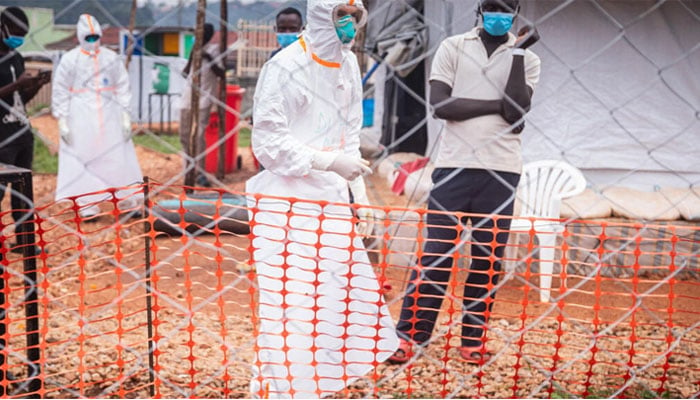[ad_1]
MUBINDI, Uganda: As Ugandan farmer Bonaventura Sinyonga prepares to bury his grandson, ancient traditions are forgotten and fear hangs in the air as a government medical team prepares the body for the funeral – the latest victim Ebola In the East African country.
Saying farewell to the dead is rarely a quiet affair in Uganda, where the bereaved seek solace in the embrace of community members who converge on their homes to mourn the loss together.
Not this time.
Instead, the 80-year-old Sinyonga is accompanied by only a few relatives as he digs a grave on the family’s ancestral land, surrounded by banana trees.
“At first we thought it was a joke or magic, but when we started seeing the dead bodies, we realized that this is real and that Ebola can kill,” Sinyonga told AFP.
His grandson Ibrahim Keon, 30, was a father of two and worked as a motorcycle mechanic in the central Kasanda region, which, along with neighboring Mubindi, is at the epicenter of Uganda’s Ebola crisis.
Both areas were below Close From mid-October, from dawn to dusk, curfews and public places are under curfew.
The resurgence of the virus after three years has sparked fear in Uganda, with cases now being reported in the capital, Kampala, as the highly contagious disease makes its way across the country of 47 million people.
According to the latest Ugandan Ministry of Health figures, 53 people have died, including children, out of more than 135 cases.
In the poor Kasazi-be village of Kasanda, everyone is afraid, says Yoronimo Nakumanyanga, Kyon’s uncle.
“Ebola shocked us more than we could have imagined. We see and feel death every day,” he told AFP at his nephew’s grave.
“I know that when the body finally arrives, people in the neighborhood will start running away, thinking that the Ebola virus is spreading through the air,” he said.
Ebola is not transmitted through the air – it spreads through bodily fluids, and common symptoms are fever, vomiting, bleeding and diarrhea.
But misinformation is still rife and a huge challenge.
In some cases, relatives of the victims exhumed their bodies after burial under medical supervision to perform traditional rituals, which led to a rise in the number of infections.
In other cases, patients have sought help from witch doctors rather than going to a health facility — a troubling trend that prompted President Yoweri Museveni last month to order traditional healers to stop treating patients.
“We have embraced the fight against Ebola and have complied with President Museveni’s directive to close our shrines for the time being,” said Wilson Akolerio Kea, one of Kasanda’s herbalist leaders.
I saw them die
The authorities It is trying to expand rural health facilities, setting up isolation and treatment tents within villages so that communities can get medical care quickly.
But the fear of Ebola runs deep.
Brian Bright Ndola, a 42-year-old trader from Mubindi, was the only survivor of four family members diagnosed with the disease, losing his wife, aunt and four-year-old son.
“When we were advised to go to the hospital for an Ebola test, we were afraid of going into isolation … and arrest,” he told AFP.
But when their condition worsened and the doctor treating them in the private clinic started showing symptoms as well, he realized that they had the dreaded virus.
“I saw them die and I knew I was next but God intervened and saved my life,” he says, wracked with regret over his decision to delay the test.
“My wife, two children and my aunt would still be alive, had we called the Ebola team early enough.”
“Greatest Hour of Need”
Today, survivors like Ndola have emerged as a powerful weapon in Uganda’s fight against Ebola, sharing their experiences as a cautionary tale but also as a reminder that patients can survive if they receive early treatment.
Health Minister Jane Ruth Assinge urged recovering patients in Mubindi to spread the message that “everyone who shows signs of Ebola should not run away from the medical personnel but run towards them, because if you run with Ebola, it will kill you.”
It is a task that many in this community take very seriously.
Doctor Hudson Konsa, who contracted the disease while treating Ebola patients, told AFP he was horrified when he was diagnosed.
“I begged God to give me a second chance and tell God that I will leave Mubandh after recovery,” he said.
But he made it clear that he could not bring himself to do so.
“I will not leave Mubindi and betray these people in their hour of greatest need.”
[ad_2]
Source link

